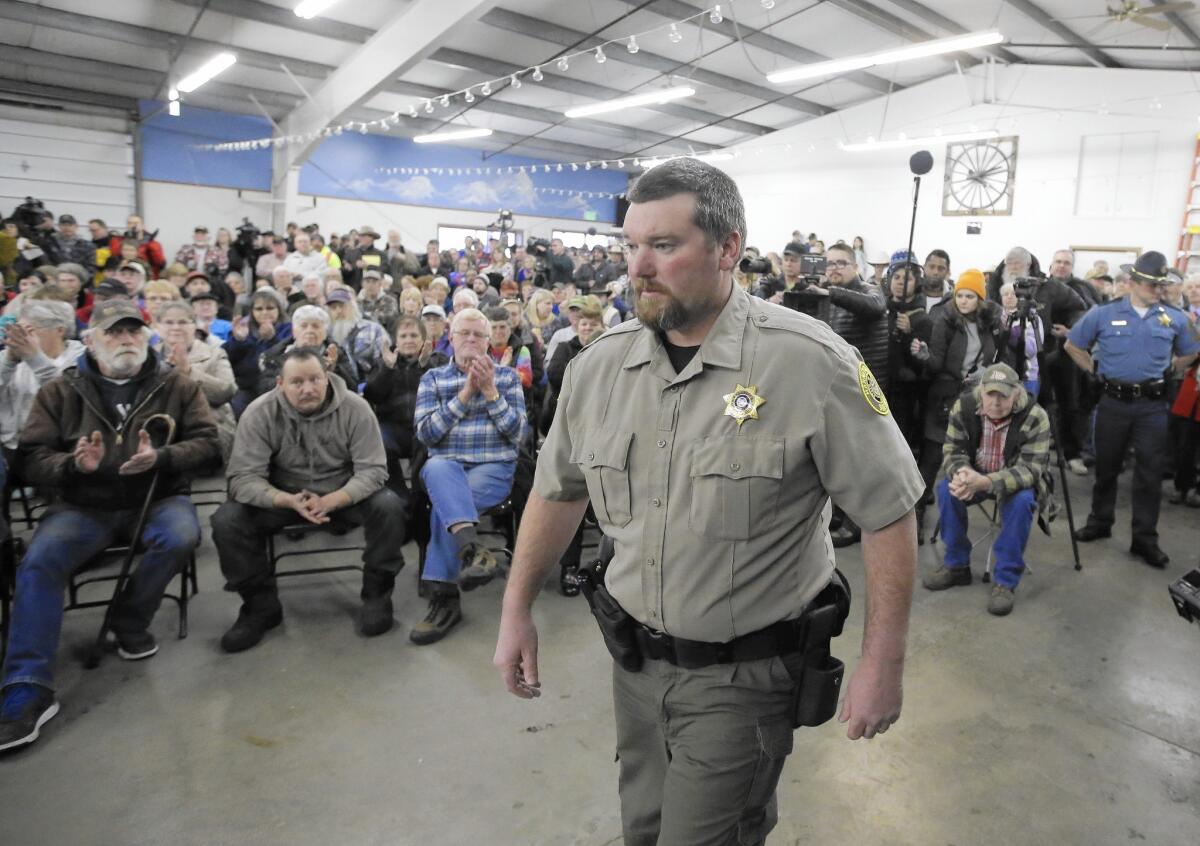In Oregon standoff, local sheriff embraces the spectacle

When Harney County Sheriff David Ward met with residents Jan. 6 in Burns, Ore., he seemed determined to create some drama, casting himself as the lead character.
- Share via
Reporting from PORTLAND, Ore. — The men who walked into an Oregon federal wildlife refuge Jan. 2 and declared it their own have an acute sense of the media moment.
They’ve seized on fears of federal interference in Western affairs and said just enough, in just the right places (usually in front of the cameras), to garner national attention. The armed occupiers have said that they are willing to stay at the refuge for years and die fighting if they must. Their goals, however, are still somewhat unclear.
After days of mumble-mouthed responses and terse press releases, Sheriff David Ward, the man who hopes to expel them, is finally learning to manage his part of the drama.
Ward, whom everyone here calls Sheriff Dave, has turned to the same devices that have landed his occupying adversaries on television: He is now holding events intended to draw media attention, manipulating the twitchy-fingered amplifier of social media and encouraging his supporters to speak up.
He is, in short, turning to spectacle.
That was evident at a meeting Wednesday at the Harney County Fairgrounds. The meeting, called by the sheriff on his home turf, was ostensibly to answer community questions.
But unlike the days leading up to the meeting, Ward seemed determined to create some drama, casting himself as the lead character. The theme and plot were simple: a man standing up to outside forces that have threatened his community, his family and himself.
Ward discussed how the occupation was impeding the liberty and personal freedoms of the residents of Hines and Burns, Ore., about 30 miles from the Malheur National Wildlife Refuge.
Ward said his wife’s tires were slashed, prompting her to “pack up and leave town.” His parents were seated in the audience, and he asked them to stand, saying they had been followed home. “Those are true Americans right there,” he said to applause.
John Lamborn, a local defense attorney, approached the microphone. Lamborn and Ward are usually on opposite sides at the local county courthouse, but not at this meeting.
“Now, there are some people questioning your patriotism,” Lamborn said.
Ward nodded.
“Sheriff Dave, you’re a veteran, right?” Lamborn asked.
Ward said he was, and proceeded to detail his military history, including tours in Somalia and Afghanistan.
The crowd cheered.
Standing face-to-face, they seemed to speak more to the audience — and the row of cameras behind them — than to each other. Each man paced with a microphone in his hand.
Ward followed the event with another Thursday afternoon — a hastily arranged meeting with Ammon Bundy, one of the leaders of the occupying group, at a neutral location.
The conflict in Harney County has become less a standoff than a battle for hearts and minds. The federal government could, at any time, clear the wildlife refuge compound of protesters.
But the police and federal agencies charged with law enforcement in this high-desert scrubland in the shadow of Steens Mountain are trying to write a new script for dealing with an occupation.
Ward has emphasized the support he’s gotten from Oregon’s sheriffs. Two of them stood next to him while he spoke with Bundy.
If Ward can help it, this is the way the occupation will end: quiet and peacefully, not with a bang but a whimper.
Twitter: @nigelduara
ALSO
No winning Powerball tickets sold; jackpot hits $1.3 billion
‘El Chapo’ met with actor Sean Penn months before recapture, Rolling Stone magazine says
Roger Goodell says NFL stadium proposals are not viable in Oakland, St. Louis and San Diego
More to Read
Sign up for Essential California
The most important California stories and recommendations in your inbox every morning.
You may occasionally receive promotional content from the Los Angeles Times.











